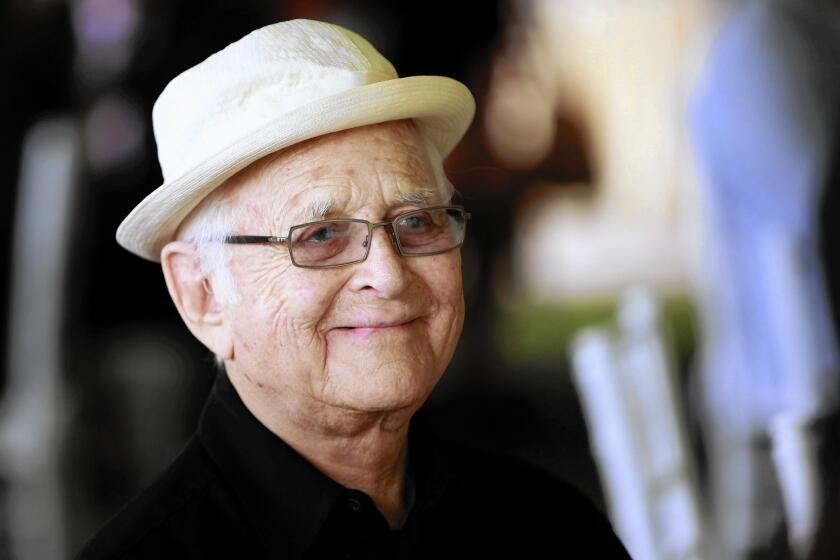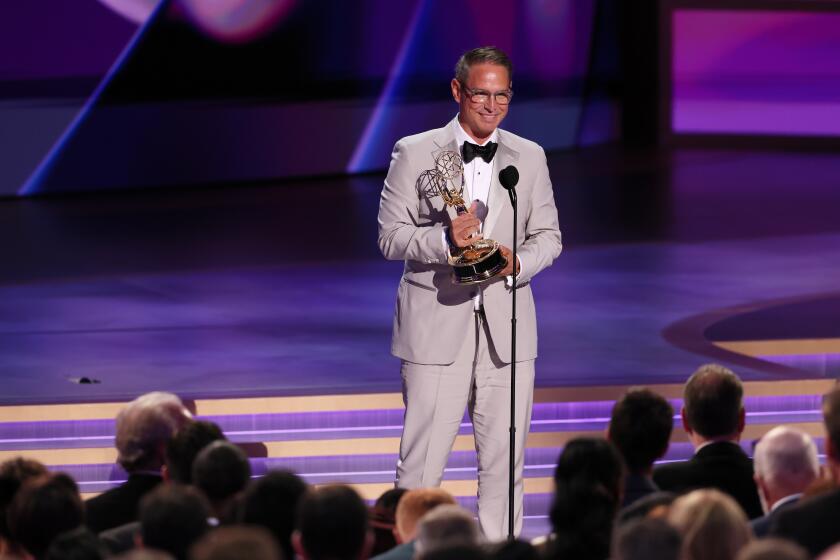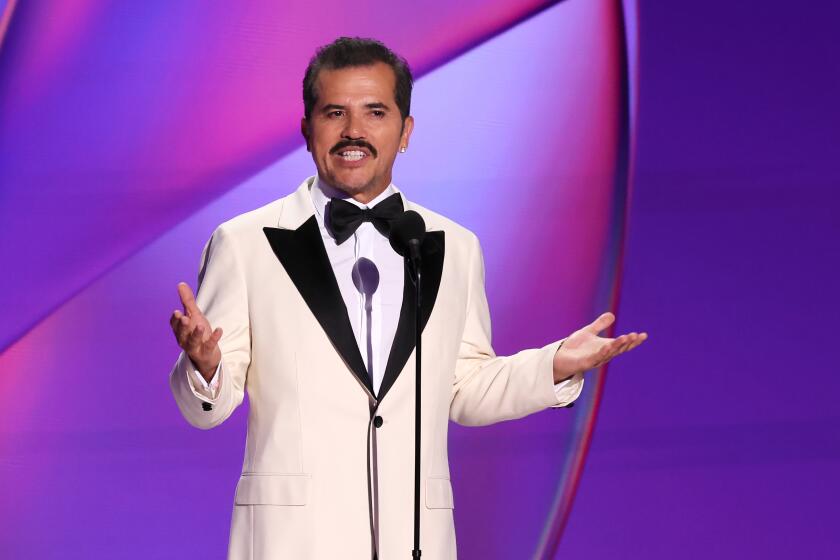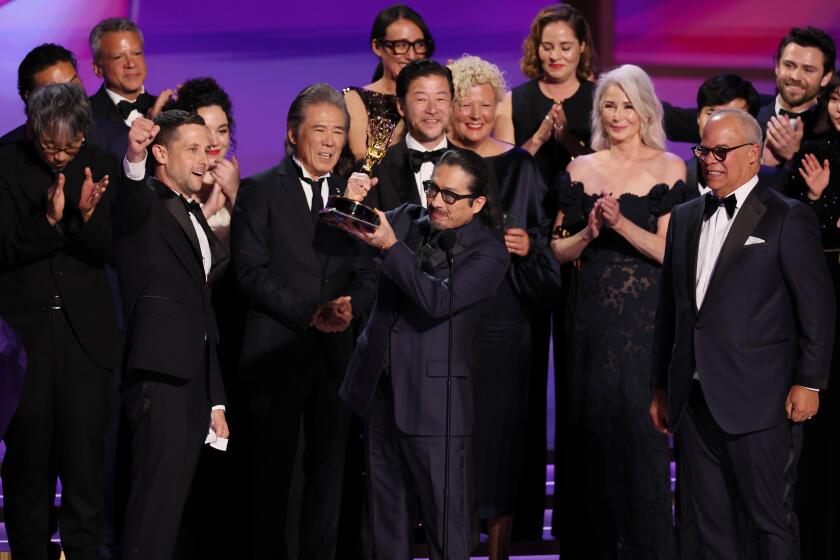Norman Lear’s latest Emmy nomination writes his partner out of history — again
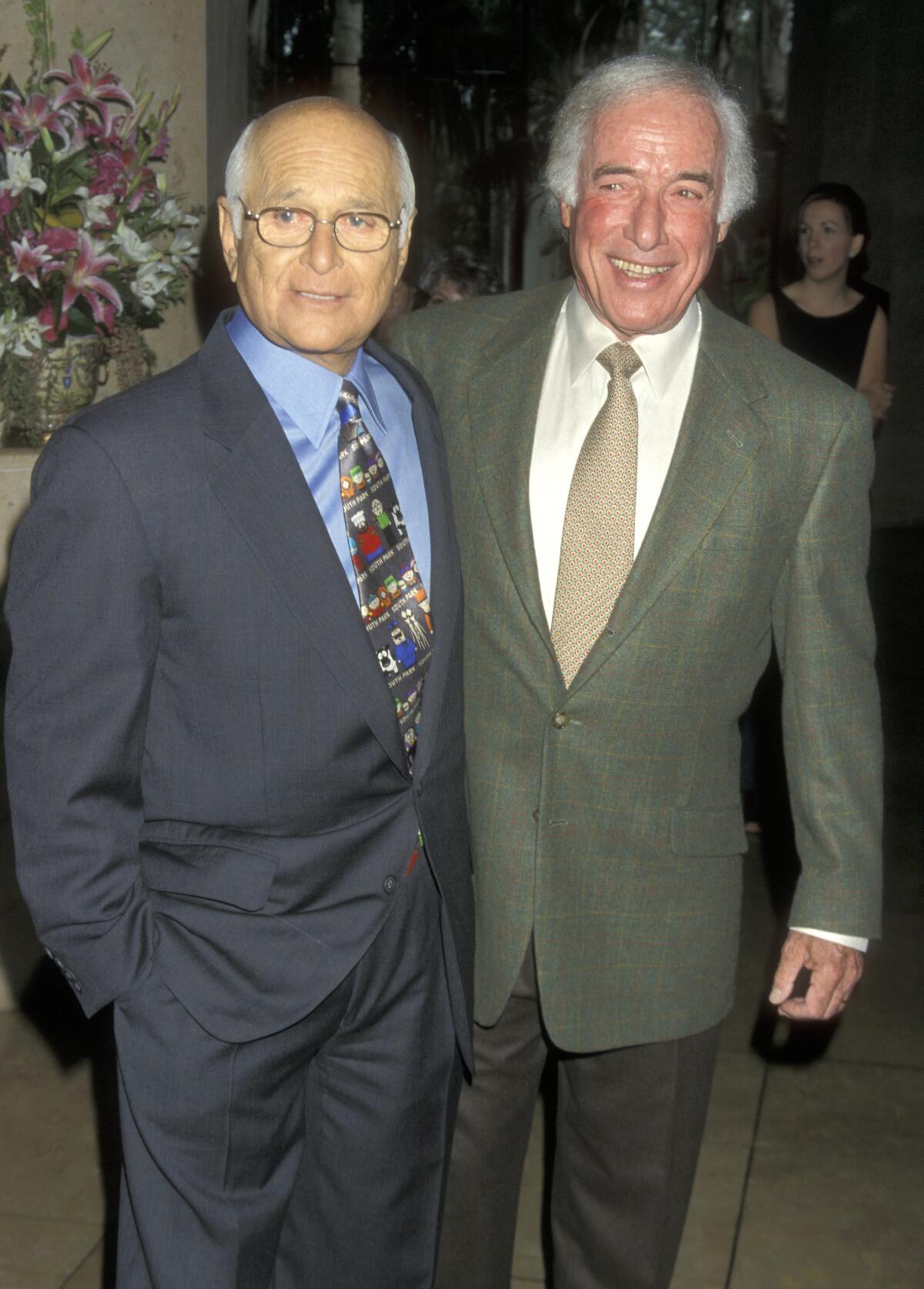
Not all of the Emmy nominations announced last week were accompanied by unanimous congratulations and Champagne toasts.
The recognition for ABC’s “Live in Front of a Studio Audience: Norman Lear’s ‘All in the Family’ and ‘The Jeffersons,’” a revival of the groundbreaking 1970s comedies, shines a fresh, harsh light on an ugly, largely hidden Hollywood split involving one of the most fruitful partnerships in TV history. The rift between Lear and his former partner, Emmy-winning producer Bud Yorkin, shows how even some of Hollywood’s brightest success stories can be tainted by darkness.
“Live in Front of a Studio Audience” and its three nominations, including variety special, was the latest triumph for Lear, who at 96 is one of TV’s most well-known and beloved producers. The special, which featured Woody Harrelson, Jamie Foxx, Marisa Tomei and others re-creating vintage episodes of those classic series in front of a live audience, scored strong ratings when it aired in May. Lear and executive producer Brent Miller have been exploring additional, similar specials with ABC executives, which would be promoted as major prime-time events.
Lear was thrilled by the nominations. “Life is a collaboration,” he wrote in a statement a few hours after the announcement. “It’s the kick of kicks to know all those I collaborated with in the ’70s could matter so much now. Nothing proves that more than the nomination this morning — and of course, sharing that nomination with my current collaborators,” which include Jimmy Kimmel and Will Farrell.
But there are reasons to question the sincerity of Lear’s sentiments. Observers inside and outside Hollywood who have followed his career maintain that for decades, Lear has consistently failed to credit Yorkin, his closest, longest-lasting collaborator and partner in their Tandem Productions. They contend that Lear has rewritten history, squeezing Yorkin — his equal partner in developing and producing the iconic series — out of the success story and positioning himself as the primary architect of the hit sitcoms.
Family members of the Yorkins, along with friends and others, point to the ABC special’s billing as “Norman Lear’s ‘All in the Family’ and ‘The Jeffersons’” as the latest and perhaps most blatant attempt by Lear to erase Yorkin’s legacy. They say Lear also twisted the true story in his 2014 autobiography and in a 2016 “American Masters” documentary chronicling his career.
“I’m all for celebrating ‘All in the Family’, but I’m upset that Norman Lear has some kind of hole in his soul that he doesn’t stomp down the process and say it isn’t and never was ‘Norman Lear’s “All in the Family,”’ said Jason Cilo, founder and CEO of the comedy content production company Meetinghouse Productions, on a late May episode of “Full Cast and Crew,” the podcast he hosts with Chris Kipiniak. “Why not just call it ‘All in the Family’? The jarring nature of the title really set my alarm bell off. I can’t think of another example where something that starts out with someone’s name like that is good. Is it Paul McCartney’s ‘The Beatles?’”
A self-proclaimed TV history nerd, Cilo said in a phone interview that it’s arguable “All in the Family” would not have seen the light of day if Yorkin, while filming a movie in England in the mid-1960s, had not seen a British series called “Till Death Us Do Part” — a controversial comedy about an obnoxious bigot and his family in London’s East End. Yorkin was overwhelmed and delighted by the series, showing tapes to friends, including director William Friedkin, who was also working in Britain at the time. The American version of that show eventually became “All in the Family.”
While Yorkin had always credited Lear with the idea that they produce the series in America, it was Yorkin who played the critical role of convincing CBS executives in an important meeting that “All in the Family,” which had been passed on by ABC, should be on their network. Yorkin also directed the version of the pilot episode — there were two — that eventually aired on CBS. The Yorkin-directed pilot included new cast members Rob Reiner and Sally Struthers, who completed the “All in the Family” ensemble as we know it.
The wound cuts even deeper for family members of Yorkin, who passed away in 2015 at age 89.
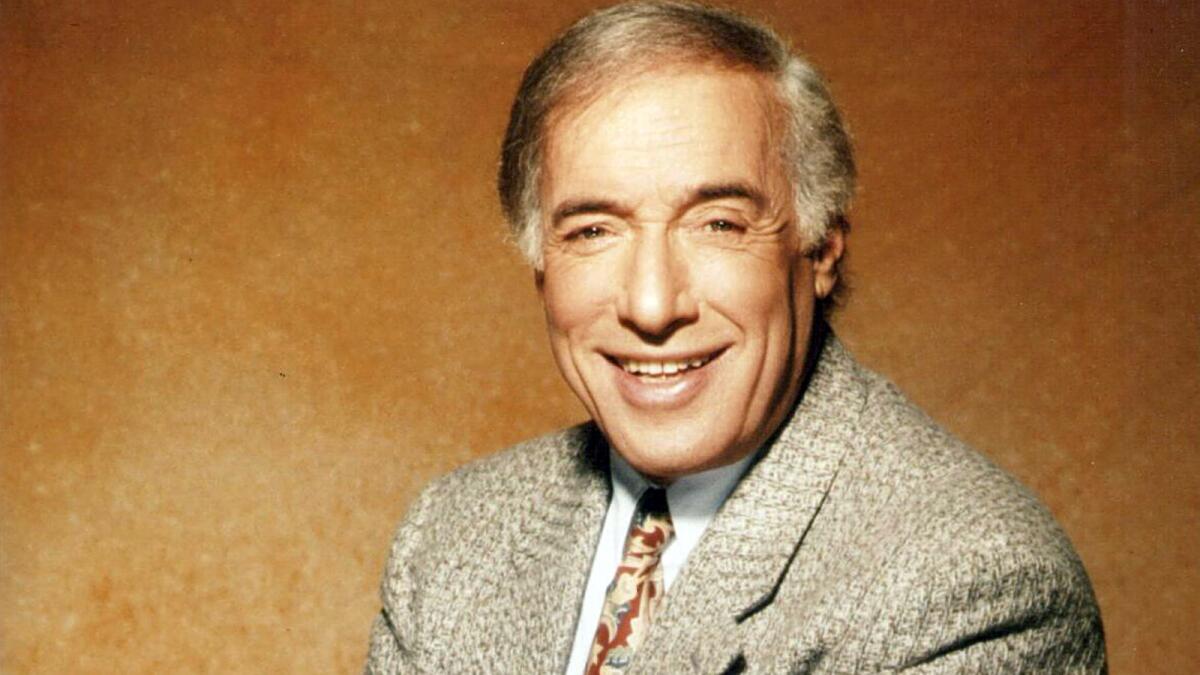
“Seeing the special referred to as ‘Norman Lear’s “All in the Family” and “The Jeffersons”’ really brought home the fact that, once again, my father has somehow been erased from the picture,” Yorkin’s daughter, Nicole, said in a telephone interview. “I was there when those shows were created and my dad and Norman were partners. We went to tapings. There were big parties with the cast and the producers and kids. I know the truth of my father’s role in these shows.”
Nicole Yorkin, an executive producer and creator with partner Dawn Prestwich of the upcoming Netflix thriller “Hit & Run,” added, “My family and the Lears grew up together. We lived around the corner from each other. My dad really loved Norman, which makes this all the more painful. My son and daughter love their grandfather and were very proud of him. It’s hard for them to understand why anyone would try to erase their grandfather’s legacy. Their questions make it more painful for me.”
The rift has also affected those who move in the same circles as the Yorkins and the Lears. “It’s been a bone of contention for some time,” said a mutual friend of the Yorkin and Lear families who asked not to be identified. “We are all mystified.”
ABC, Lear and the other producers of the special, and Sony Pictures Television, which helped produce the special, declined to comment.
The Yorkin-Lear partnership, under the umbrella Tandem Productions — its name inspired by the notion of two men bicycling together uphill, according to Donna McCrohan’s 1987 history of “All in the Family” — is one of the most enduring and successful in TV history. In addition to “All in the Family” and “The Jeffersons,” the duo developed and produced several other hits, including “Sanford and Son,” the “All in the Family” spinoff “Maude” and “Good Times.” The series were worlds apart from more conventional TV sitcoms and transformed the landscape of prime time, taking on subjects such as politics, racial prejudice, abortion, homosexuality and religion with an approach that was simultaneously humorous and confrontational. The Yorkin-Lear comedies had an estimated viewership of 120 million by the mid-1970s.
Lear was the public figure of the pair, while the more private and lower-key Yorkin generally preferred to remain in the background. But behind the scenes, they worked side by side for 25 years, and were equals.
Paris Barclay, who was president of the Directors Guild of America at the time, wrote in a statement following Yorkin’s death: “Through his work on ‘All in the Family,’ including directing one of the original pilots, Bud helped usher in a new era of topical television with a groundbreaking mix of comedy and social commentary, making the show one of the most influential in TV history.”
Cilo said “Live in Front of a Studio Audience” offered an opportunity for Lear to pay tribute to his former partner.
“Tandem worked because you had a guy like Norman who was comfortable with being out front, while Bud was a little more of an operator, and was quieter and less heat-seeking,” he said. “It seems that there’s a certain irony in all this, since their company was called ‘Tandem Productions.’ In his autobiography, Norman acknowledges that he needs more attention, more credit. It’s both sad and a little funny that this is still going on.”
In Lear’s 2014 autobiography, “Even This I Get to Experience,” Yorkin is not mentioned in the section on the evolution of “All in the Family.” Lear writes that he read a squib in TV Guide about “a British show, ‘Till Death Us Do Part,’ that centered on a bigoted father and his liberal son who fought about everything under the sun. ‘Oh my God,’ I thought instantly. ‘My dad and me.’”
Lear wrote how he continually fought with his father, who called him “the laziest white kid he had ever met.” “I was flooded with ideas and knew I had to do an American version of this show.”
A chapter about the premiere of “All in the Family” winds up with Lear writing, “America had been introduced to the subversive mind of Norman Lear, and not one single state seceded from the union.”
When Lear was promoting his book, Yorkin’s former wife, Peg Yorkin, wrote a letter to The Times blasting him for his omission: “Bud and Norman both developed the show. Bud actually directed the pilot that was produced (they had competing versions).”
She added: “I actually fought with Bud about getting his own publicist when Norman said he was hiring a firm (way back when). Bud wouldn’t have it. He was sure the record would speak for itself, and now he can’t even speak for the record, as he is hospitalized with profound dementia... I felt it was time for someone to speak up for the man, even though he never allowed anyone to do so when he was lucid.”
Thanks to the fun and funny Norman Lear Lear ... like the play, Norman was all-encompassing, authoritarian, lovable, irascible, but always human, funny, fun and of course brilliant [“Norman Lear on Families He’s Known, Book Review, Oct. 19].
That letter from Peg Yorkin intrigued filmmakers who at the time were working on a PBS “American Masters” documentary about Lear. They asked the Yorkins for home movies and videos and insinuated that the documentary would contain a sequence about the partnership.
But when “Norman Lear: Just Another Version of Me” aired in 2016, none of the footage provided by the Yorkins was included, and Bud Yorkin was again mostly sidelined — leaving the family feeling betrayed and angry.
Whether Lear had any role in jettisoning the sequence is unclear. Heidi Ewing and Rachel Grady, the directors of the documentary, did not return phone calls for comment.
Yorkin established himself in the 1950s as an innovator during the so-called “Golden Age of Television,” when live TV shows were the norm. He became one of the most sought-after directors of musical variety shows and specials. He worked with such stars as Jack Benny, Dinah Shore and Tennessee Ernie Ford, and directed Fred Astaire in a stunning special that won nine Emmys.
When Yorkin and Lear joined forces in 1959, Yorkin said they were strongly bonded professionally and personally.
“There was a lot of love and respect between the two of us,” Yorkin said in a 1997 interview with the television academy. “We had a lot in common, a certain taste, a certain drive.”
In the “American Masters” documentary, there is footage of Lear in several television appearances talking about how, when he was a young boy, his grandfather would write every month to the president of the United States with the greeting, “My Dearest Darling Mr. President.” Sometimes, he said, his grandfather would get responses from the White House.
Later in the documentary, Lear acknowledges that the story was fabricated. He says it was a friend of his whose grandfather would write to the president.
“I adopted it, or, more honestly, I stole it,” Lear says. “I wasn’t proud of it. But I did what I had to do.”
More to Read
The complete guide to home viewing
Get Screen Gab for everything about the TV shows and streaming movies everyone’s talking about.
You may occasionally receive promotional content from the Los Angeles Times.
